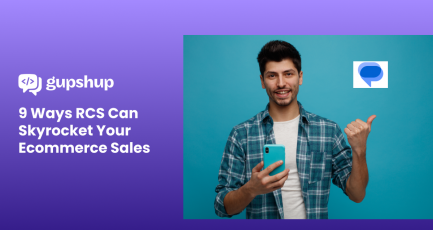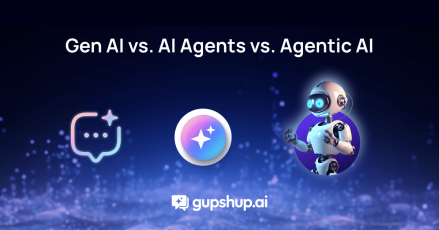How Can WhatsApp For Businesses Help Brands Boost Sales in Indonesia?

Introduction
The e-commerce industry in Indonesia is growing. By 2026, it’s projected to hit nearly $90.47 billion. But like any thriving sector, Indonesian e-commerce faces its share of hurdles, such as operational challenges, revenue fluctuation, and a lack of advanced customer experience (CX) systems. WhatsApp for Business can help you overcome these challenges and take a leap ahead of your competitors.
Around 69% of Indonesian businesses fail to use modern AI-based systems, and 43% miss out on advanced CX systems. Results? Poor returns on investment (ROI) due to inadequate departmental support.
Now, in this scenario, how can you improve your revenues and ROI in the Indonesian market?
The answer lies in embracing conversational commerce. Among the top tools in this space is the WhatsApp API. WhatsApp for Business, adopted by 50 million companies globally, offers an all-in-one solution for automating e-commerce operations and enhancing customer journeys.
Within this technological shift, WhatsApp Flows is one such significant innovation. As an integral part of the WhatsApp Business Platform, they enable businesses to create rich, interactive experiences that go beyond basic messaging.
Companies can design end-to-end customer journeys with Whatsapp chatbots that are efficient and engaging, fostering deeper connections with their audience.
So, how can you leverage different tools like Whatsapp Flows to sustain your business growth? Let’s explore!

WhatsApp – Transforming Your Business Operations

Suppose Peter is browsing your online clothing store in Indonesia. He adds a shirt to the cart but leaves the app without completing the purchase. Later that evening, he received a friendly message on WhatsApp reminding him about the cart and offering a special discount.
This is the magic of WhatsApp, a new kind of UX that helps brands design rich, customizable experiences on the app.
WhatsApp Flows are automated conversation sequences within WhatsApp for Business. These pre-designed guides help customers engage in specific interactions, like product selection or checkout, nudging customers toward sales conversion.
Over the last few years, WhatsApp Business has become the most effective marketing, commerce, and support channel.
Indonesia ranked third on the world’s list, has more than 112 million active WhatsApp users. So, it’s not surprising that tools like WhatsApp for Business can help businesses stand out, generate sales, and increase ROI.
So, how does this work?
1. Streamlined Sales Process
Gone are the days of navigating complex websites. Your specially designed WhatsApp chatbots can now guide your customers through the entire buying journey, prompting them to add items to their cart, proceed to checkout, and complete the purchase — all without leaving WhatsApp.
2. Abandoned Cart Reminders
Let’s face it: Cart abandonment is a harsh reality for all e-commerce businesses, where it is most challenging to convert browsers into buyers.
With WhatsApp, you can gently remind customers who have left items in their carts. These reminders can even include personalized offers or discounts to incentivize the completion of the purchase.

3. 24/7 Availability
Your customers might feel the need to contact you anywhere, anytime. With WhatsApp for Business, you will never need a human associate to stay up late at night solving queries.
WhatsApp API provides a solution that never sleeps. Your WhatsApp chatbots can handle basic inquiries around the clock, ensuring a consistent customer experience every single time.
4. Order Tracking and Updates
The best and only way to maintain a good business-customer relationship is transparency. Keep your customers informed about the status of their orders by sending direct notifications to their WhatsApp for Business. This will increase trust among your customers and reduce their stress about your service.
5. Personalized Product Recommendations
All customers have different choices and preferences. You need to use your WhatsApp Flows to analyze who needs what, their order frequency, spending per order, and more.
Personalize your recommendations according to these data. Based on customer behavior and purchase history, your WhatsApp chatbot can suggest relevant products to your potential customers and increase the likelihood of additional purchases.

6. Data-Driven Optimization
The most fascinating thing is that WhatsApp for Business comes with advanced data analytical properties, giving you valuable data to rely on.
It tracks all the key metrics and gives you detailed analytics on things like customer response time, conversion rates, and flow completion rates. This way, you know which parts of your flow are most engaging and which need improvement.
You can also use A/B testing of different flow strategies in WhatsApp API to help optimize the customer journey for maximum impact.
7. Compliance and User Privacy
The conversation between your WhatsApp chatbot and your customer should always be limited to the inbox.
In your customer-centric business, where user privacy is essential, bring WhatsApp API to prioritize user consent. Your business needs to comply with regulations before sending broadcast messages as well.
To sustain for a long time and to make cash, build trust by respecting user privacy, and keep a positive relationship with your customers.
Effective Strategy to Use WhatsApp for Sales

You already know that WhatsApp offers a multitude of features to streamline Indonesian e-commerce business. But, are you wondering how to use WhatsApp for Sales? You can always add effective strategies to your WhatsApp with the help of the features it offers.
Here is how you can build an effective strategy:
1. Understand your customers
First, you need to know what kind of customers need your products. You can conduct surveys or analyze customer interactions to understand common challenges faced during the buying process.
2. Start with a clear goal
Address your intended outcome first. Do you want to generate leads, want people to purchase your product, and want them to book an appointment? This ensures a focused flow that achieves its objective.
3. Keep it concise and engaging
People scroll quickly on WhatsApp. To capture their attention within a limited time, you need to use clear, concise language, images, and GIFs to maintain customer interest.
Customers should feel comfortable using your WhatsApp chatbot service. Help them choose different options, such as their preferred color and size, or explore additional product options. Tell them what to do next, whether visiting a product page, chatting with a sales representative, or completing the purchase.
4. WhatsApp forms and quick replies
WhatsApp Forms are some really helpful variants within WhatsApp flows. They can collect valuable customer information, such as size preferences or budget constraints.
Using a built-in form, you can ask your customers for the perfect size of the shirt they are scrolling through.
You can also set up pre-written responses to common customer inquiries within the flow. It saves time and pops up whenever your customer initiates a chat, ensuring consistent messaging.
5. Data rendering and personalization
Personalization is why you should buy a WhatsApp API. It can suggest so many things based on your customer’s input.
For example, if the customer wants a shirt, your WhatsApp chatbots can display suitable shirts with the same material, size, or color. It might even suggest complementary trousers or sunglasses based on your customer’s style preferences taken from his past orders.
6. Integrate with CRM
Most importantly, integrate CRM with your WhatsApp API to gain a view of customer interactions and personalize future marketing efforts.
7. Localization
Lastly, remember you are working in a country full of diverse cultures. Ensure all the content is in clear and natural Indonesian to enhance user experience and build trust with local customers.
Do not forget to be mindful of Indonesian cultural nuances when crafting greetings, emojis, and overall flow tone.
Conclusion
Whatsapp is not the future but the preset need for businesses!
It offers a way to enhance CX across every part of the consumer journey.
- During discovery, you can leverage it for lead generation via Click-to-Chat Ads, or offer a dynamic alternative to static lead-gen forms.
- In the consideration stage, it engages your customers and takes them a step ahead toward conversion.
- For purchase and service stages, your customers can use it to access orders and gather insights about their purchase and its whereabouts. You can also gather customer feedback on the same platform, nice and easy.
These are just initial use cases; the potential for diverse applications through WhatsApp is vast. It can change the game forever!
Now, how can you adapt the best WhatsApp Business API in Indonesia?
Embrace the power of conversational commerce and integrate WhatsApp API into your sales strategy with Gupshup. Remember, the future days of Indonesian e-commerce will be seen hand-in-hand with conversational AI and WhatsApp for Business.
Don’t miss out on this opportunity! Get in touch today!
Frequently Asked Questions (FAQs)
Is WhatsApp Business API safe?
Yes! WhatsApp API protects user privacy, and all your chats with businesses are encrypted. Businesses need permission to send messages and must follow regulations.
How to do sales on WhatsApp?
WhatsApp for Business lets you chat with customers and share product info. It also offers other helpful and personalized services to make sales.
How can chatbots help in increasing sales?
WhatsApp chatbots answer basic questions 24/7, recommend products, and guide customers towards buying what they need.
Discover the transformative potential of WhatsApp Business for enterprises and its role in driving growth with these resources:




